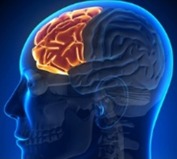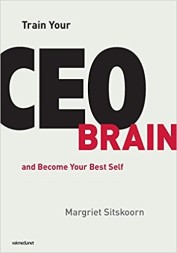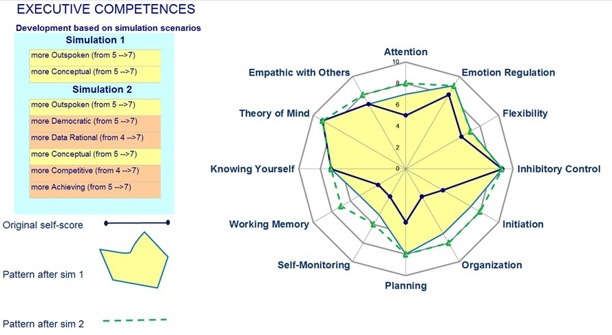AWARENESS AND REFLECTION:
SUCCESSFUL SELF-DEVELOPMENT
SUCCESSFUL SELF-DEVELOPMENT
The key to your self-development lies in your executive brain[1], the part of your brains that is busy with your ability to adopt to changes, making plans, learn from feedback, out-of-the-box thinking, developing a vision, making complex decisions, pro-social behaviour, feeling motivated and the ability to control your emotions and suppress ineffective behaviour.
The executive brain, also named the CEO-brain, is located in the
prefrontal cortex.
For realising your goals three things are fundamental:[2]
You must know the goals you aspire to realise, keep these goals in mind and monitor how far you are from fulfilling your objectives.
2 Motivation
You must be motivated enough to put plenty of energy in realising your goals.
3 The right capabilities
You must have the right competences available, to set out and walk the path, and to cope with all obstacles and seductions you will encounter on your way.
[1] I refer to Margriet Sitskoorn’s book IK2. This book has inspired me because she clearly describes that self-development and becoming successful is always possible, regardless your age or where you come from.
Margriet Sitskoorn's book has also been issued in English:
Train your CEO Brain and Become your Best Self.
[2] Wilhelm Hofmann, Booth School of Business, Chicago University.
Executive competences
The psychologists Don Norman and Tim Shallice have outlined the different situations in which normal routine activation of your behaviour do not suffice for achieving optimal performance:
- situations where you need planning and decision taking;
- situations where you need revision and correction of your behaviour;
- a new type of behaviour or new course of actions;
- dangerous or technically difficult situations;
- situations where ingrained behaviour or habits need to be corrected.
The executive competences you need to achieve optimal performance, to develop yourself and to become successful are:
1 Attention 7 Planning
2 Emotion Regulation 8 Self-Monitoring
3 Flexibility 9 Working Memory
4 Inhibitory Control 10 Knowing Yourself
5 Initiation 11 Theory of Mind
6 Organization 12 Empathic with Others
The LD-Toolbox and the development of your executive competences
In response to the modern insights in the development of executive competences, LDpe has invested in an add-on to the LD-Toolbox, which visualises how the proposed development scenarios contribute to the development of these competences.
Both the by LDpe proposed scenarios, the quick-wins scenario and the longer term development scenario, that primarily aim at the development of one's role- and style-portfolio, turn out to be beneficial as well to the development of ones executive competences.
As shown in the example below.
Theory of Mind
The competence 'Theory of Mind', is essential for self-reflection and your self-development, as well as for becoming a better leader.
Theory of Mind (often abbreviated ToM) is the ability to attribute mental states - beliefs, intents, desires, pretending, knowledge, etc. - to oneself and others and to understand that others have beliefs, desires, intentions, and perspectives that are different from one's own.
Theory of Mind is therefore a necessary competence, for instance, to be empathic.
This is a crucial competence in 'Personal Behavioural Effectiveness', as discussed in the previous chapter.







